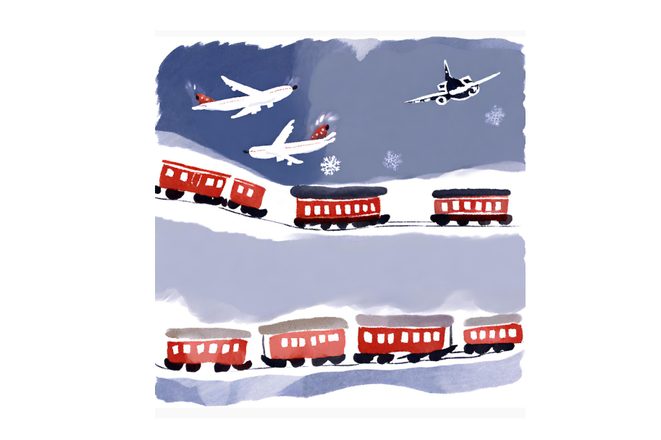Travelling by train from Bratislava to several European cities on Christmas is on average twice as expensive as travelling by plane, says Greenpeace Slovakia.
In its analysis, the organisation compared the December costs of rail and air travel between the Slovak capital and 12 cities in Europe: Amsterdam, Barcelona, Berlin, Brussels, Copenhagen, Cologne, London, Milan, Paris, Rome, Venice, and Warsaw.
More Greenpeace findings:
The biggest price difference between trains and flights was found when travelling to London on December 21. The train trip cost €189.50, which is 7.6 times more than the Wizz Air flight (€24.99).
The most expensive train tickets were on the route from and to Barcelona with an average price of €309.60, followed by the route from London and to London for €294.08.
The cheapest average train prices were found on the Bratislava–Berlin route with an average price of €35.67, followed by the Bratislava–Warsaw route, where the train always cost €42.
Night trains are cheaper than day trains, but most of them start in Vienna. In winter, only two night trains leave from Bratislava: one to Berlin and one to Warsaw.
Train prices are more predictable than flight prices.
Source: Greenpeace (Nov 7-27, 2023)
The organisation analysed these routes in each direction and for three trips: December 21, 23 and 28. These are one of the busiest travel days in Europe.
A train trip between Bratislava and London was 4.5 times more expensive than getting on a plane and flying on this route. Travelling by train between Bratislava and Barcelona (4.3 times), and between Bratislava and Milan (2.4 times) are also among the most expensive train trips.
Of all the routes analysed, only a Bratislava - Berlin train ticket was always cheaper than a plane ticket. People would almost always pay less for train trips to Amsterdam and Warsaw as well.
“Sustainable rail transport remains unaffordable for many,” Greenpeace Slovakia spokesperson Miroslava Ábelová said, explaining that train travel produces 80 percent less carbon dioxide emissions per person per kilometre than air travel.
The organisation believes that the EU and the Slovak government should tackle the problem.
The analysis further shows that Bratislava, of all the 12 places, is directly connected by train only with Berlin and Warsaw. As for direct flights, the Slovak capital has direct connections with four cities (Rome, Milan, London and Brussels), according to the analysis.
Greenpeace noted that most railway companies, including the Slovak carrier ZSSK and the Austrian carrier ÖBB, did not offer tickets to or from Bratislava 12 weeks before Christmas. Most started to sell them in the second half of October. Conversely, plane tickets were at travellers’ disposal three months in advance.
“The European Commission and governments in Europe must finally create conditions for the easier booking of cross-border train tickets,” added the spokesperson for Greenpeace.
According to Greenpeace, the EU and national governments could scrap VAT on train tickets and traction power, reduce tax benefits for air transport, and finance affordable climate tickets.



 Train travel produces 80 percent less carbon dioxide emissions per person per kilometre than air travel. (source: Greenpeace)
Train travel produces 80 percent less carbon dioxide emissions per person per kilometre than air travel. (source: Greenpeace)